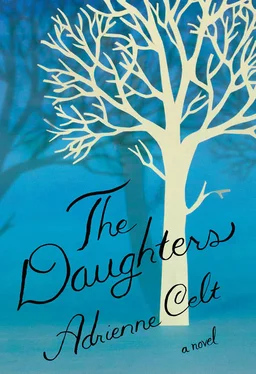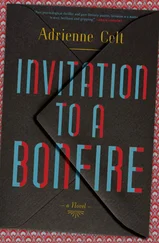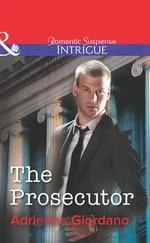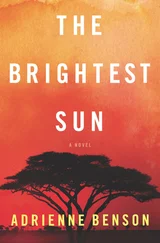I’m on hold. Alone with a baby girl I have reason to be wary of, a baby girl whose birth I can’t remember. Her first hours are a black space in my body’s history that leaves me feeling as if I woke up in the wrong skin.
John asked me yesterday if it was really going to be okay for him to go back to work and leave me alone. He was worried, he said, about me not rehearsing.
“Doctor’s orders,” I told him. As if he didn’t know. When my contractions got intense we hailed a cab to the hospital, and I hoisted my bulky body into the car easily enough. But partway through the drive something went wrong. I felt warmth spreading over my thighs and cursed, thinking that my water had broken, and we would have to pay the cleaning fee for the cab. When I touched the wet spot, though, my hand came up red. I remember the earth tilting. Inside me something gave way, clicked, cracked, and I can’t recall anything else until the moment I found myself in a hospital bed, strange hands affixing an IV to my arm. Then I lost consciousness again.
“She was a little too eager to come into the world,” my doctor said later. She sat beside me with her hand on my arm while John slept in a chair nearby. Apparently this is what happens when you trip unknowingly close to death — you cause physical sympathy. The baby was in an incubator, the doctor explained, for observation. “Tried to push through the wrong way.” She pressed lightly on my stomach with her free hand, checking the dressing, and I gasped out an aah . “You see. It’s unusual. But not unheard of.” She frowned. “You’ll have to be careful with yourself. Are you in a position to do that?”
The proper term for what happened to me is a rupture or dehiscence , an event usually reserved for flowering plants. Spontaneous opening of the fruit. Splitting to spit out seeds and flesh. Dehiscence also occurs with old wounds.
When I draw a very deep breath I can feel the place where my body is torn, a hairline scoring in the womb. By now it’s supposed to be healing, but I can’t picture it that way. I can only imagine the tear as fresh and electric. After all, it responds to me with great sensitivity, whenever I do the things I most wish to do. Like breathing in. Exhaling. Reaching for a high, clear sound.
Supposedly I will absorb this pain like a gong absorbs a blow. First it will radiate through me, in waves. Then I will settle into its absence, perhaps a little warmer with the memory of the vibration. Supposedly I’ll wake up one day soon and my lungs will open as sails do in a high wind. I won’t need to worry that singing will cause renewed dehiscence . Or that there is something dangerous about my daughter. Something inherent, that she cannot control.
The doctor couldn’t tell me exactly how long this process of healing would take though. Every body is different, she said. Our estimates only exist because people ask for them.
To fear my own child: a ridiculous thought. But in this case, not without its reasons, its precedent.
John woke up when he heard me and the doctor whispering, and he said, “Oh, Lu.” I thought he was just happy to see me, happy I had opened my eyes. But then I blinked and saw him afresh — there was something fragile in my husband that hadn’t been there before. John tells stories, is sarcastic. He makes the world what he wants it to be. It troubled me to see him that way, unable to hide his pain.
He ran a hand over his face, heavily. As if to pull it off and replace it. His smile was strained. Why not? I thought. He had every reason to be uncomfortable — the discs of his spine crushed by the awkward chair he’d slept in, the plain dumb fact of where we were, and why.
Still, I couldn’t help but worry that maybe the doctor had been waiting to share something with me. Some terrible news.
“She?” My lips trembled as I spoke. I was tired, I realized. Still so tired. “Did you see her?”
John looked at the doctor, his head cocked to the side, in a way I didn’t like. He came over and crouched beside my bed, lay his chin down on my arm so he had to speak through his teeth, with the weight of his skull bearing down on his jaw. I held my breath.
“Every piece just where it should be. She’s a trouper.”
“Oh.” I closed my eyes in relief. I wanted her there in my arms, but I wasn’t sure I could hold her. My head was so light on my shoulders. So heavy on the pillow. Kara was barely real to me yet, but I knew that first I wanted her safe.
“Sleep would be a good idea.” John took my hand, kissed it. “And sweet dreams.”
I was already halfway gone, the swell of my exhaustion rising up and drawing me towards a black slumber. But a thought flashed into view then, just briefly.
“Is Ada here?” I asked.
If John hesitated, I couldn’t tell.
“She was,” he said. It was a sensible reply. And with sleep there to take me, I had no time to mull over its vagueness, or the guilty sound that hung, hangdog, under it.
Oh, Lu . I should have known there was something more; should have heard it in the long woe of the Oh , the who inside my name, Lu . But I fell asleep and didn’t wake up again until the next morning, when I found a face hovering inches from my own under the hospital lights.
“Just checking, sweetie.” The nurse, I realized, was holding my wrist, measuring my racing pulse. I’m not certain if it was her touch that jarred me out of sleep, or something in my deep unconscious. After all, there was nothing between them — the tension of incomprehension and the tension of awareness.
When she was sure my heart could withstand the rate at which it was pumping my blood and had satisfied herself that I was not about to swallow my tongue, the nurse brought me a cup of water and instructed me to sip, to cool me down and to help the saline drip in rinsing the anesthesia from my system.
“People fight the drugs,” she told me. “That’s what gets your pulse up so high; you’re reacting against it like a virus. Except”—she paused in thought—“sort of psychologically.”
It didn’t feel psychological. My limbs grew lighter and heavier of their own accord, and my stomach churned what little water I’d been able to swallow. John was gone, though he’d left his jacket balled up on a bedside chair.
“My husband,” I said. “Is he with the baby?”
“Oh.” The nurse wrote something down on a clipboard. “No. Well, I’m not sure. But I think I saw him somewhere with a phone book. The funeral home, you know.” She pinched her mouth up. “You poor thing.”
The room was so pale, the light so white-green, that for a nauseous second I wondered, Am I dead? I lifted one hand to my cheek and ran my fingertips over the surface of it. Tiny prickles, the heat of skin responding to skin.
So I was alive. But then why did John need to plan a funeral?
“Where is the baby?” I asked, my voice small.
“Still in the pediatric ICU.” The nurse picked the cup of water up off the tray beside my bed and stuck the straw between my lips. “Drink. Yes. One more sip. All right.” She set the cup back down and sighed. “Honey, do you remember anything that happened?”
I shook my head.
“Well,” she said, “from what I hear it was kind of a mess. Your husband thought the baby was coming early, and the doctors thought she was coming late”—I cringed, since I was the one who’d lied about my due date to John—“and he called your grandmother, and that’s when things got all helter-skelter.”
Ada had blown in faster than seemed possible—“Like she was waiting right outside the door,” the nurse told me — and she and John got into a shouting match. The nurse didn’t say what about, and I didn’t ask. I breathed up towards the ceiling of my room, where a water stain bloomed out from the corner. Rusty orange with hints of green.
Читать дальше












